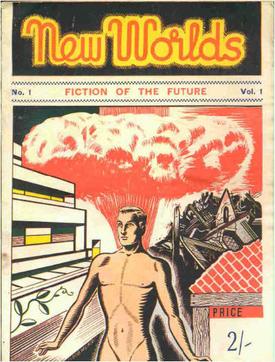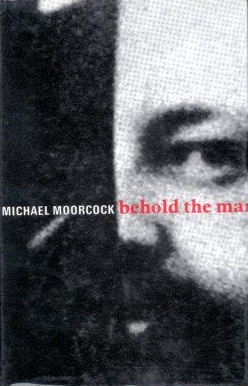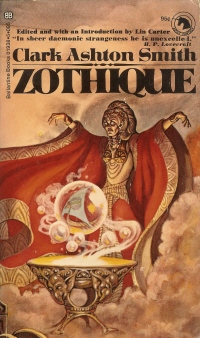
Michael John Moorcock is an English–American writer, particularly of science fiction and fantasy, who has published a number of well-received literary novels as well as comic thrillers, graphic novels and non-fiction. He has worked as an editor and is also a successful musician. He is best known for his novels about the character Elric of Melniboné, which were a seminal influence on the field of fantasy in the 1960s and 1970s.
The New Wave was a science fiction style of the 1960s and 1970s, characterized by a great degree of experimentation with the form and content of stories, greater imitation of the styles of non-science fiction literature, and an emphasis on the psychological and social sciences as opposed to the physical sciences. New Wave authors often considered themselves as part of the modernist tradition of fiction, and the New Wave was conceived as a deliberate change from the traditions of the science fiction characteristic of pulp magazines, which many of the writers involved considered irrelevant or unambitious.

Elric of Melniboné is a fictional character created by English writer Michael Moorcock and the protagonist of a series of sword and sorcery stories taking place on an alternative Earth. The proper name and title of the character is Elric VIII, 428th Emperor of Melniboné. Later stories by Moorcock marked Elric as a facet of the Eternal Champion.

Michael John Harrison, known for publication purposes primarily as M. John Harrison, is an English author and literary critic. His work includes the Viriconium sequence of novels and short stories (1971–1984), Climbers (1989), and the Kefahuchi Tract trilogy, which consists of Light (2002), Nova Swing (2006) and Empty Space (2012).

Science Fantasy, which also appeared under the titles Impulse and SF Impulse, was a British fantasy and science fiction magazine, launched in 1950 by Nova Publications as a companion to Nova's New Worlds. Walter Gillings was editor for the first two issues, and was then replaced by John Carnell, the editor of New Worlds, as a cost-saving measure. Carnell edited both magazines until Nova went out of business in early 1964. The titles were acquired by Roberts & Vinter, who hired Kyril Bonfiglioli to edit Science Fantasy; Bonfiglioli changed the title to Impulse in early 1966, but the new title led to confusion with the distributors and sales fell, though the magazine remained profitable. The title was changed again to SF Impulse for the last few issues. Science Fantasy ceased publication the following year, when Roberts & Vinter came under financial pressure after their printer went bankrupt.

New Worlds was a British science fiction magazine that began in 1936 as a fanzine called Novae Terrae. John Carnell, who became Novae Terrae's editor in 1939, renamed it New Worlds that year. He was instrumental in turning it into a professional publication in 1946 and was the first editor of the new incarnation. It became the leading UK science fiction magazine; the period to 1960 has been described by science fiction historian Mike Ashley as the magazine's "Golden Age".

witzend, published on an irregular schedule spanning decades, is an underground comic showcasing contributions by comic book professionals, leading illustrators and new artists. witzend was launched in 1966 by the writer-artist Wally Wood, who handed the reins to Bill Pearson from 1968 to 1985. The title was printed in lower-case.

George Chetwynd Griffith-Jones was a British writer. He was active mainly in the science fiction genre—or as it was known at the time, scientific romance—in particular writing many future-war stories and playing a significant role in shaping that emerging subgenre. For a short period of time, he was the leading science fiction author in his home country both in terms of popularity and commercial success.

Behold the Man (1969) is a science fiction novel by British writer Michael Moorcock. It originally appeared as a novella in a 1966 issue of New Worlds magazine; later, Moorcock produced an expanded version that was first published in 1969 by Allison & Busby. The title derives from John 19, Verse 5, in the New Testament: "Then Jesus came out, wearing the crown of thorns and the purple robe. And Pilate said to them Behold the Man".

Invasion literature is a literary genre that was popular in the period between 1871 and the First World War (1914–1918). The invasion novel was first recognised as a literary genre in the UK, with the novella The Battle of Dorking: Reminiscences of a Volunteer (1871), an account of a German invasion of England, which, in the Western world, aroused the national imaginations and anxieties about hypothetical invasions by foreign powers; by 1914 the genre of invasion literature comprised more than 400 novels and stories.

The Battle of Dorking: Reminiscences of a Volunteer is an 1871 novella by George Tomkyns Chesney, starting the genre of invasion literature and an important precursor of science fiction. Written just after the Prussian victory in the Franco-Prussian War, it describes an invasion of Britain by a German-speaking country referred to in oblique terms as The Other Power or The Enemy.

Before Armageddon: An Anthology of Victorian and Edwardian Imaginative Fiction Published Before 1914 is a collection of stories, including invasion literature, and one article, all edited by Michael Moorcock. Originally published in hardback by W.H. Allen in 1975, it was re-issued as a paperback by Star in 1976.

The Black Corridor is a science fiction novel by Michael Moorcock. It was published in 1969, first by Ace Books in the US, as part of their Ace Science Fiction Specials series, and later by Mayflower Books in the UK.

Zothique is a collection of fantasy short stories by Clark Ashton Smith, edited by Lin Carter. It was first published in paperback by Ballantine Books as the sixteenth volume of its Ballantine Adult Fantasy series in June 1970. It was the first themed collection of Smith's works assembled by Carter for the series. The stories were originally published in various fantasy magazines in the 1930s, notably Weird Tales.
Michael Butterworth is a British author, publisher and campaigner who first became known publicly as an author of New Wave science fiction. He later founded the publishing house Savoy Books with David Britton in 1976 and the contemporary art journal Corridor8 with Sarajane Inkster in 2009. He successfully fought a charge of obscenity against Britton's controversial novel Lord Horror during 1992, the first novel to be banned in England since Hubert Selby Jr.'s Last Exit to Brooklyn in 1967.

John Picacio is an American artist specializing in science fiction, fantasy and horror illustration.
Charles Platt is a British author, journalist and computer programmer. He relocated from England to the United States during 1970 and is a naturalized U.S. citizen. He has one child, Rose Fox, who edits science-fiction, fantasy, and horror book reviews. Platt is the nephew of Robert Platt, Baron Platt of Grindleford.
This is a bibliography of the works of Michael Moorcock.
"The Monster of Lake LaMetrie" is a short story by American writer Wardon Allan Curtis. It was originally published in September 1899 in Pearson's Magazine and collected in Sam Moskowitz's Science Fiction by Gaslight, Hank Davis' The Baen Big Book of Monsters and Michael Moorcock's England Invaded.

The War of the Worlds is a science fiction novel by English author H. G. Wells. It was written between 1895 and 1897, and serialised in Pearson's Magazine in the UK and Cosmopolitan magazine in the US in 1897. The full novel was first published in hardcover in 1898 by William Heinemann. The War of the Worlds is one of the earliest stories to detail a conflict between humankind and an extraterrestrial race. The novel is the first-person narrative of an unnamed protagonist in Surrey and his younger brother in London as southern England is invaded by Martians. It is one of the most commented-on works in the science fiction canon.














